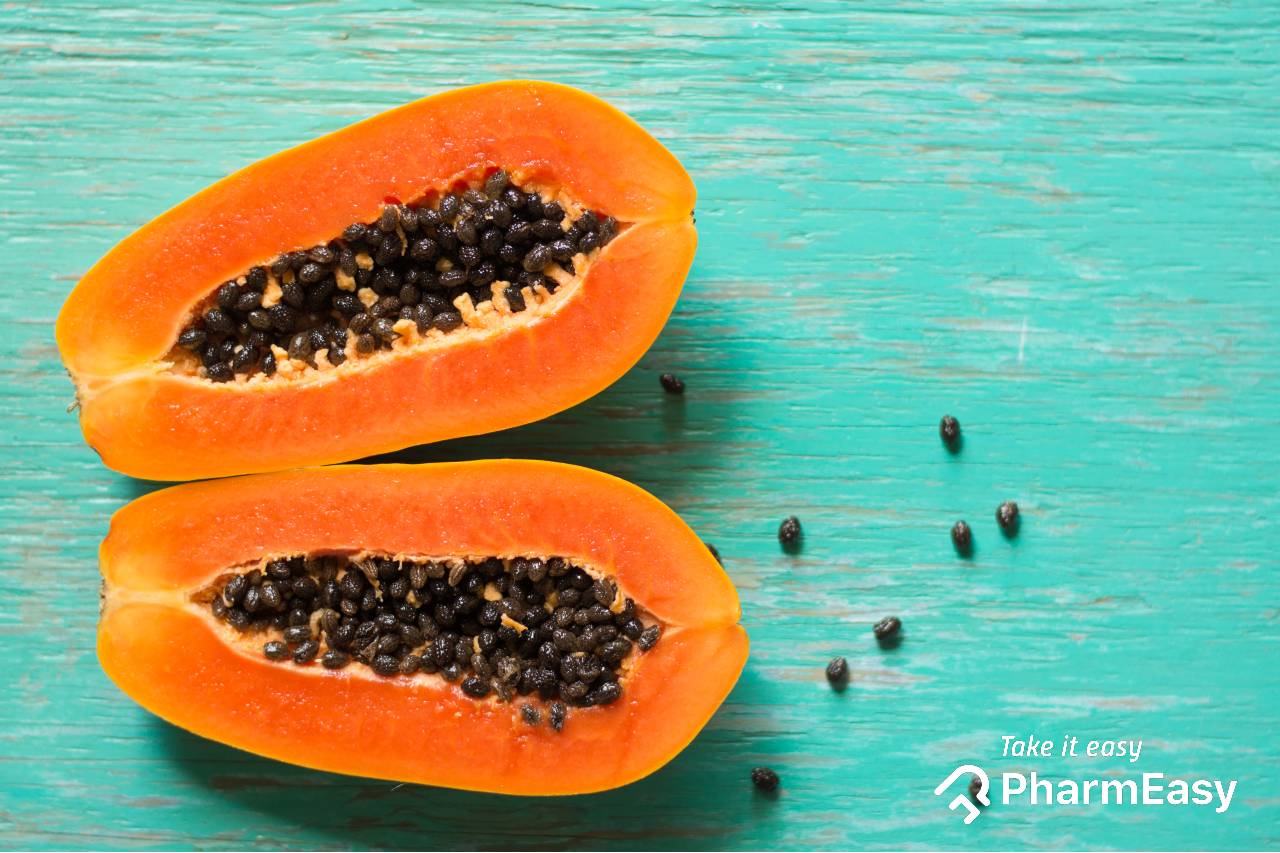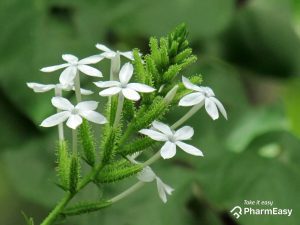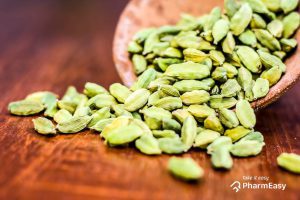Botanical name
Carica papaya

Papaya is a very famous herbaceous plant, and they grow well in a warm climate. It is the tallest plant without branches. The stem of Papaya grows up to 10 m tall with leaves on its top. The leaves of Papaya are prominent about 70 cm wide. The papaya fruit is oval to round, and, in some cases, it is like a giant pear.
Fruits are 50 cm long with 20 cm wide, and the maximum weighs up to 10 kg. Papaya fruit skin is tough and thin; due to its bitterness, it is not eaten. During harvesting time, the skin of papaya fruit is green, but upon ripen, it turns yellow, and the fruit is ready to be eaten. The pulp of papaya fruit is yellow, orange, pink, and even light red. The fruit of Papaya contains black seeds. ”Erandakarkati” is another name of Papaya, known in Ayurveda, and it is low calorific fruit with vitamin C and A. As per Ayurveda, the juice obtained from Papaya leaves helps increase the platelet count and inhibit the growth of the dengue virus.
Table of Contents
Sources of Papaya
Papaya is originated from the Americas, especially from Central America and southern Mexico. It is also native to Mexico and India. The most favourable climate for Papaya’s growth is tropical climates.
Other Names for Papaya
The different names of Papaya are Carica papaya, Gopalakarkati, Madhukarkati, Papeyaa, Melon tree, Pappiyaa, Pawpaw, Papaiyu, Erandakaakadi, Papita, Papitaa, Pappaay, Pirangi, Karumatti, Karmaasu, Papai, Papaayaa, Pappali, Erandakharbujaa, Bobbaasi, Boppayi, Paringi.
Nutritional components of Papaya
The one medium-sized Papaya contains approximately: 120 calories, 30 g of carbohydrate, 5 g of fiber, 18 g of sugar, and 2 g of protein. Papayas are also a good source of folate, vitamin A, magnesium, copper, and pantothenic acid. Papaya also contains vitamin B, alpha, and beta-carotene, zeaxanthin, lutein, vitamin E, calcium, potassium, and vitamin K. Lycopene is the most potent antioxidant present in Papaya and tomatoes.
Health benefits of Papaya
- Choline is an essential component present in Papaya, which helps the body in sleep, muscle movement, memory, and learning.
- Choline is an integral part of cellular membranes, which helps in the transmission of nerve impulses.
- Choline helps in assisting in the absorption of fat and further reduces chronic inflammation.
- Papaya has different bioactive components which help in preventing asthma.
- Papaya contains a powerful antioxidant agent that helps fight against the free radicals and prevents cancer.
- The flavonoids content in Papaya helps to fight and inhibit the growth of the Dengue virus.
- The regular intake of Papaya juice helps increase the platelet count in the body and further boosts immunity during diseased conditions.
- Papaya contains nutritional components such as potassium, fiber, and vitamins, which helps in the healthy functioning of the heart, which helps manage high blood pressure.
- The consumption of papaya seeds and their juice effectively manages bleeding during piles and liver enlargement.
- During psoriasis, management of ringworm and worm infections, the paste of Papaya seeds is very effective externally.
- Mashed Papaya is very beneficial for enhancing wound healing to further preventing infection of burned areas.
- For Men’s, Papaya seeds act as an anti-fertility agent.
- The latex of Papaya fruit contains an essential enzyme that is used to treat decubitus ulcers.
- The Papain enzyme is famously used in the meat industry for the tenderization process
Relation of Papaya with skin and hair health
- Papaya is good for hair health as it contains vitamin A, which is an essential nutrient required for sebum production that keeps hair moisturized.
- The Vitamin A of Papaya fruit is also necessary for the growth of body tissues, including skin and hair.
- The Vitamin C of Papaya is an essential component required to build and maintain collagen to support the skin structure.
- Papaya contains powerful antioxidants, which are beneficial for the skin.
- The vitamin C of Papaya also helps reduce inflammation and fight against different diseases by improving and strengthening immunity.
- The protease enzyme present in Papaya helps in wound healing.
- The antibacterial activity of Papaya helps in arresting the infection.
- The facial mask prepared using papaya fruit pulp helps reduce pigmentation, wrinkles, and acne on the skin.
Papaya for cancer
Papaya fruit is rich in antioxidant such as beta-carotene, which may help to reduce cancer risk. For the young generation, eating Papaya helps prevent prostate cancer.
Papaya for bone health
Vitamin K is a fat-soluble vitamin present in the seed oil of Papaya fruit. Its consumption is good for health as it enhances calcium absorption, reducing the urinary excretion of calcium. It improves the calcium quantity in the body to strengthen and rebuild bones.
Papaya for digestion
The papain enzyme of the latex of the Papaya fruit very helpful in improving digestion. It is also helping in breaking the proteins during the meat tenderization process to enhance the softness and juiciness of the meat. Papaya contains a good amount of fibre and water content, which help to prevent constipation and improves digestive health.
Papaya for Diabetes
Papaya is effective for treating Diabetes because of its hypoglycemic and antioxidant property. The regular intake of supplements of extract of Papaya leaves helps to increases the uptake of glucose and controls blood sugar level.
Recommended Dosage of Papaya
The ayurvedic dosage of Papaya varies according to its variants of different forms of Papaya products.
| Product | Preparation | Dosage/ Day |
| Tablets | Take two Papaya tablets of Papaya. Swallow it with water after every meal. | Two times |
| Leaf Juice | Take five teaspoons of Papaya leaf Juice. Juice is preferably taken with an empty stomach in the morning. | Two times |
| Capsules | Take two Papaya capsules of Papaya. Swallow it with water after every meal. | Two times |
| Leaf Churna | Take half a teaspoon of Papaya leaf churna and mix it with two teaspoons of honey. The mixture is taken after lunch and dinner. | Two times |
Side effects and Precautions While Using Papaya
- It is recommended to avoid the consumption of Papaya as it leads to flatulence and loose motions.
- The latex of Papaya late is responsible for irritation and blistering on the skin because of its hypersensitivity to people. Therefore, it is advised to consult a doctor in this situation.
FAQs
Is Papaya responsible for abortions?
It is said that the consumption of Papaya by a pregnant woman leads to abortions like situations. When Papaya is taken in unripe form, it contains a high amount of latex, which increases contractions in the uterus upon its consumption. It is always recommended to take advice from a doctor.
Is Papaya responsible for causing gas?
Yes, sometimes the consumption of more amount of Papaya is responsible for causing the gas problems. Papaya is a natural remedy for improving digestion, reducing constipation, and symptoms of irritable bowel syndrome. There are reports which showed that the excess consumption of Papaya is responsible for causing intestinal gas.
Can I consume Papaya seeds?
Yes, it is recommended to consume the seeds of Papaya, and it is entirely safe. The seed of Papaya is best for chewing rather than swallowing them directly. The eating of Papaya seeds helps promote bowel movements, which further helps to release all the toxins from the body.
Summary
Papaya is well known for its antioxidant property, which is very beneficial for hair and skin health. In Ayurveda, the juice of Papaya leaves is known to have antiviral properties. The best example for it is to inhibit the dengue virus and thereby increase platelet count. To improve digestive health, it is recommended to have a Papaya juice daily in the morning diet.
Disclaimer: The information provided here is for educational/awareness purposes only and is not intended to be a substitute for medical treatment by a healthcare professional and should not be relied upon to diagnose or treat any medical condition. The reader should consult a registered medical practitioner to determine the appropriateness of the information and before consuming any medication. PharmEasy does not provide any guarantee or warranty (express or implied) regarding the accuracy, adequacy, completeness, legality, reliability or usefulness of the information; and disclaims any liability arising thereof.
Links and product recommendations in the information provided here are advertisements of third-party products available on the website. PharmEasy does not make any representation on the accuracy or suitability of such products/services. Advertisements do not influence the editorial decisions or content. The information in this blog is subject to change without notice. The authors and administrators reserve the right to modify, add, or remove content without notification. It is your responsibility to review this disclaimer regularly for any changes.
Read more about: Bhumi Amla: Uses, Benefits & Side Effects



 By
By 










Comments